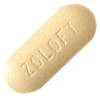Zoloft (Sertraline) at Canadian Pharmacy for Treatment of Depression
Zoloft (Sertraline) at Canadian Pharmacy: Pharmacological Action, Indications, Contraindications, Important Information, Zoloft and Pregnancy, Zoloft and Breastfeeding, Fertility and Zoloft, Taking Zoloft, Side Effect, Withdrawal, Overdose, Interaction with Other Drugs
CONTENT
- Zoloft (Sertraline) Pharmacological Action
- Indications
- Contraindications
- Important Information
- Zoloft and Pregnancy
- Zoloft and Breastfeeding
- Fertility and Zoloft
- How to Take Zoloft?
- Zoloft Side Effects
- Zoloft Withdrawal
- Zoloft Overdose
- Interactions with Other Drugs
Zoloft (Sertraline) Pharmacological Action
 Zoloft is one of the modern medicines applied in general practice. It is an antidepressant and a powerful specific reuptake inhibitor of the neurotransmitter serotonin (5-HT). It almost has no effect on the dopamine and reuptake of noradrenaline. At therapeutic dosages, it blocks the uptake of serotonin in platelets. It has no sedative, stimulating, or anticholinergic effect. Zoloft does not augment adrenergic activity, does not cause drug dependence, or an increase in body weight during long administration.
Zoloft is one of the modern medicines applied in general practice. It is an antidepressant and a powerful specific reuptake inhibitor of the neurotransmitter serotonin (5-HT). It almost has no effect on the dopamine and reuptake of noradrenaline. At therapeutic dosages, it blocks the uptake of serotonin in platelets. It has no sedative, stimulating, or anticholinergic effect. Zoloft does not augment adrenergic activity, does not cause drug dependence, or an increase in body weight during long administration.
Indications
- Treatment of depression of various etiology and prevention of major depressive episodes
- Post-traumatic stress disorder (PTSD) with or without agoraphobia
- Obsessive-Compulsive Disorder (OCD) in children and adults
- Panic disorder
- Social phobia

Contraindications
- Hypersensitivity to sertraline and other ingredients of the drug.
- Age under 6 years old in children who suffer from OCD. For the other indications, the drug is contraindicated in patients younger than 18 years old.
- The application of Zoloft is contraindicated with MAOIs of irreversible action related to the risk of new syndrome manifested in tremor, agitation, and hyperthermia. You should not start taking Zoloft within 14 days after termination of irreversible MAOIs. Sertraline therapy should be stopped 7 days prior to initiation of treatment with irreversible MAOIs.
- Concurrent application with pimozide.
Important Information
It is important to be cautious when assigning sertraline to patients with organic brain disease, seizure disorders, hepatic and/or renal insufficiency, and severe weight loss.
Also, care should be taken while prescribing Zoloft with other drugs that increase serotonergic neurotransmission.
Caution is necessary when appointing Zoloft in combination with drugs that have a proven ability to affect platelet function.
Patients should be careful when simultaneously applying sertraline and tricyclic antidepressants.
In addition, caution should be exercised when assigning Zoloft to patients with risk factors for the prolongation of the QT interval and development of torsades de pointes.
Generic Zoloft and Pregnancy
The controlled trials of Zoloft in pregnant women have not been held. Thus, the application of the drug in these patients is only possible if the expected benefits to the mother outweigh the potential risks to the fetus.
However, there is no data about the birth defects caused by sertraline. Animal studies have shown the possible effect of sertraline on reproductive function. Perhaps, its influence is associated with maternal toxicity caused by the pharmacodynamic effects of sertraline on the fetus.
In some newborns, whose mothers took sertraline during pregnancy, there are symptoms similar to withdrawal reactions. This phenomenon was also observed when taking other SSRI antidepressants.
Women of childbearing age, who intend to apply Zoloft, should be advised to use effective means of contraception.
Zoloft Generic and Breastfeeding
During breastfeeding, small amounts of Zoloft are detected in milk. Generally, minor amounts of sertraline were detected in the plasma of newborns. Treatment with this drug during breastfeeding is not recommended. If treatment is required, it is recommended to stop breastfeeding.
Newborns, whose mothers took Zoloft during pregnancy, had complications requiring additional hospitalization, respiratory system support, and tube feeding. It is necessary to carefully monitor newborns, whose mothers took sertraline during later stages of pregnancy, particularly in the third trimester.
Newborns may experience the following symptoms: respiratory distress, unstable body temperature, cyanosis, seizures, apnea, difficulties in feeding, hypoglycemia, vomiting, hyperreflexia, muscle twitching, irritability, tremor, prolonged crying, and difficulty sleeping. These symptoms may be related to immediate serotonin effects or may be symptoms of the drug withdrawal. In most cases, these complications begin immediately or less than 24 hours after birth. In some cases, the clinical picture can be similar to the symptoms of the serotonin syndrome.
Newborns, whose mothers took SSRIs during pregnancy, may also have the risk of pulmonary hypertension. Pulmonary hypertension happens in 5 of 1,000 cases and is one of the causes of morbidity and infant mortality.
Fertility and Zoloft
In one of two studies on mice, decreased fertility was observed when using sertraline in the dosage of 80 mg/kg (it is 4 times higher than the maximum recommended dose for people).
According to the described clinical cases, taking certain SSRIs affect the quality of sperm.
How to Take Generic Zoloft?
Zoloft should be taken one time a day, in the morning or evening, regardless of the meal.
Treatment of depression and OCD requires a dosage of 50 mg a day.
Treatment of PTSD, social phobia, and panic disorder requires an initial dosage of 25 mg a day, which is augmented after 1 week to 50 mg a day. The application of the drug in such a way assists to decrease the frequency of early adverse effects characteristic of the panic disorder.
If there is little effect in patients taking Zoloft at the dosage of 50 mg a day, its daily intake may be augmented. The dosage should be augmented at intervals not longer than once a week to a maximum recommended dosage of 200 mg a day.
The initial therapeutic effect may happen within 7 days. However, the general effect is generally achieved after 2-4 weeks.
Maintenance dose during prolonged treatment should be minimally effective with its respective changes depending on the therapeutic effect.
Efficacy and safety of Zoloft are observed in children with OCD (from 6 to 17 years old). In adolescents (from 13 to 17 years old) who suffer from OCD, Zoloft treatment should begin at a dose of 50 mg a day.
In elderly patients, the medicine is applied in the same range of dosage as that of younger people.
Caution is required when assigning Zoloft to patients with liver disease. Patients who suffer from hepatic insufficiency should take lower doses or have an augmented interval between the intakes of the drug.
Zoloft is greatly metabolized in the body. Due to the slight renal excretion of sertraline, its dosage correction is not necessary.
Sometimes, Medications is not the only way out https://www.canadianhealthmall.com/getting-over-depression-until-it-gets-you.html

Zoloft Side Effects
The most common side effect is nausea. Treatment of social phobia with Zoloft was accompanied with sexual dysfunction (abnormal ejaculation) in 14% of cases, compared with 0% during the placebo application. These unpleasant side effects are dose dependent and often happen during the continued therapy. Adverse effects observed in patients who suffer from panic disorder, OCD, PTSD, and social phobia do not differ from those in major depressive disorder.
Some undesirable reactions during the continued therapy may diminish in intensity and frequency, and generally, do not lead to discontinuation of therapy.
The application of Zoloft in elderly patients has been related to the development of serious hyponatremia.
Adverse reactions in children are generally similar to the ones in adult patients.
In clinical studies, children had the following adverse reactions:
- Very frequent: headaches, diarrhea, insomnia, nausea.
- Common: chest pain, vomiting, affective lability, irritability, anorexia, aggressive behavior, agitation, impaired attention, blurred vision, dyspepsia, fatigue, urinary incontinence, acne, and flatulence.
- Uncommon: prolongation of the QT interval, attempts of suicide, paresthesia, seizures, depressive symptoms, hyperventilation, hallucinations, anemia, abnormal liver function, otitis media, pain in eyeballs, rhinitis, weight loss, apathy, involuntary muscle contractions, and chest pain.
Unknown frequency: enuresis.
Zoloft Withdrawal
Termination of treatment with Zoloft often leads to the development of withdrawal syndrome. The most frequently reported symptoms include dizziness, sleep disturbances, agitation, nausea, tremor, and headaches. In general, these symptoms are mild, moderate, and limited. However, in some patients, they may be severe and long-lasting. In this regard, if the patient doesn’t need to continue treatment with Zoloft, withdrawal of the drug by a step-by-step reduction of the dose is necessary.
Generic Zoloft Overdose
Overdose can lead to the development of severe poisoning, coma, and death when taking Zoloft with other medicines and/or alcohol or when used in monotherapy. It is, therefore, necessary to carry out intensive care at any sertraline overdose.
Overdose can lead to serotonin syndrome with the prolongation of the QT interval, arrhythmia ventricular, nausea, vomiting, tachycardia, dizziness, agitation, sweating, diarrhea, myoclonus, and hyperreflexia. In some cases, there was the development of coma.
In case of overdose, constant monitoring and intensive supportive care of vital functions of the body are required. The introduction of the activated carbon together with a laxative may be more effective than gastric lavage. Airway patency must be maintained.
Interactions with Other Drugs
When applying Zoloft together with pimozide, there was amplification in pimozide concentration. This was not due to any changes in ECG because the mechanism of this interaction is not known. Concomitant application of pimozide and Zoloft is contraindicated.
Severe complications were observed while taking Zoloft and MAO inhibitors. The development of serotonin syndrome may occur as well as rigidity, autonomic lability, irritability, confusion, and in some cases coma.
There was no amplification of the effects of ethanol, haloperidol, carbamazepine, or phenytoin on psychomotor and cognitive performance. However, the combined application of Zoloft and ethanol should be excluded.
When taking warfarin with sertraline, a slight but statistically crucial enhance in prothrombin time is observed. In these cases, it is advisable to monitor the prothrombin time at the start of treatment with Zoloft and after its withdrawal.
Team of Canadian Pharmacy – www.canadianhealthmall.com


